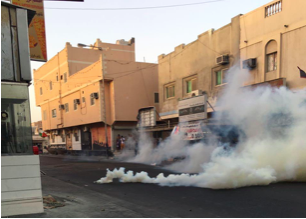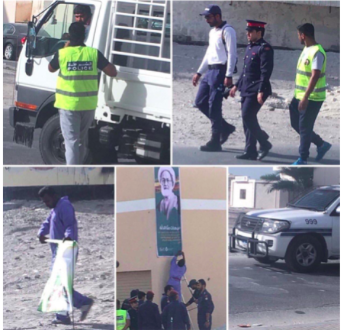6 October 2016 - A Bahraini high criminal court today postponed the sentencing of Nabeel Rajab to 31 October. No reason was provided for the postponement. The leading human rights defender faces up to 15 years in prison in a trial that has flagrantly disregarded his human rights. We, the undersigned, condemn the prosecution of Nabeel Rajab on charges related to his freedom of expression.
Rajab, the president of the Bahrain Center for Human Rights (BCHR), is facing multiple charges of “disseminating false rumors in time of war”, “insulting a neighboring country” and “insulting a statutory body” under articles 133, 215 and 216 of the penal code. These are in relation to remarks he tweeted and retweeted on Twitter in 2015 about the humanitarian crisis caused by the Saudi-led war in Yemen - with Saudi Arabia the "insulted" country - and documenting torture in Bahrain's Jau prison. The charges collectively carry up to 15 years in prison.
In September, Bahrain’s prosecution brought new charges against him for “undermining the prestige of the state” after the New York Times published Rajab’s opinion piece, Letter from a Bahraini Jail. This charge could add another year to his sentence.
In his letter, Rajab wrote:“No one has been properly held to account for systematic abuses that have affected thousands.” The BCHR estimates there are approximately 4000 political prisoners in the country. Rajab also asked: “Is this the kind of ally America wants? The kind that punishes its people for thinking, that prevents its citizens from exercising their basic rights?”
The US has called for Rajab’s release “full stop”, and the EU’s top human rights official yesterday expressed his “hope” for Rajab’s release. Present at Rajab’s trial today was a representative of the EU delegation to Saudi Arabia, and representatives of the Italian, Spanish, UK and US embassies in Bahrain.
According to Rajab’s lawyer, the sentencing was scheduled to occur today. Rajab attended, despite being in poor condition following surgery on 3 October, and the judge was expected to render the judgement. But instead, the judge stated that the court had taken note of the request submitted today by Rajab’s lawyers requesting his medical reports, and the court would adjourn the case to 31 October. It is not usual for the court to mention such a request for medical reports had been made, and there was no clear reason to the defence team as to why the court referred to it.
Rajab’s lawyer states there is no link between the adjournment and their request for the medical reports. The court had denied previous requests for Rajab’s medical documents, because the Ministry of Interior and Public Prosecution state that he had been provided with all required are since his detention began. The court thus denied Rajab access to his own records. The defence team submitted their latest request today morning. The court did not clarify whether it had accepted or rejected the request, nor did it clarify whether there are medical reports in the case file.
In September, the UN High Commissioner for Human Rights used his opening statement at the 33rd session of the Human Rights Council to warn Bahrain: "The past decade has demonstrated repeatedly and with punishing clarity exactly how disastrous the outcomes can be when a Government attempts to smash the voices of its people, instead of serving them." Today’s sentencing is yet another case of the Bahraini government attempting to smash those voices.
Bahraini forces arbitrarily arrested Rajab on 13 June 2015, the opening day of the UN Human Rights Council’s 32nd Session. His arrest coincided with travel bans on activists, the forced exile of Zainab Al-Khawaja under threat of rearrest, and the dissolution of the Al Wefaq political society.
Following his June arrest, courts prosecuted Rajab for the two charges first brought against him in April 2015, with a new third charge of “insulting a neighbouring country” - Saudi Arabia. Tweets used as evidence against Rajab, seen by BIRD, BCHR and ADHRB, include documentation of torture and retweets of Amnesty International, Human Rights Watch and Index on Censorship.
Police placed Rajab in solitary confinement for the majority of his pre-trial detention. After 15 days in solitary, on 28 June 2016 Rajab required urgent medical attention after losing a significant amount of weight, developing an irregular heartbeat and developing immune system deficiencies due to poor prison conditions. Authorities transferred Rajab back to police custody the following day.
Rajab’s prosecution is the latest in a series of repressive actions that have led to the dissolution of political societies, imprisonment of protestors and religious clerics, and curtailment of activists’ free movement.
The right to freedom of expression is protected under article 19 of the Universal Declaration of Human Rights and article 19 of the International Covenant on Civil and Political Rights, the latter of which Bahrain acceded to in 2006. Nabeel Rajab’s prosecution and sentencing represents a clear violation of this right.
We, the undersigned, condemn this flagrant violation of the rights to freedom of expression.
We call on the Government of Bahrain to:
- Release immediately Nabeel Rajab and all other prisoners of conscience
- Drop all outstanding charges against persons being prosecuted for exercising their freedom of expression
- Repeal articles 133, 215 and 216 of the penal code, and all other penal code articles which violate the right to free expression.
We call on the governments of the United Kingdom and United States, and the European Union to:
- Condemn immediately the ongoing prosecution of Nabeel Rajab
- Act towards securing Rajab’s release from detention, as well as of all other prisoners of conscience.
Americans for Democracy & Human Rights in Bahrain (ADHRB)
Bahrain Center for Human Rights (BCHR)
Bahrain Institute for Rights and Democracy (BIRD)
European Centre for Democracy and Human Rights (ECDHR)








